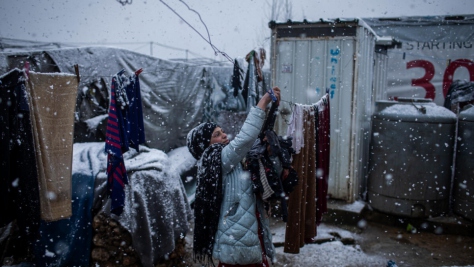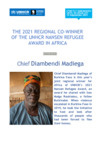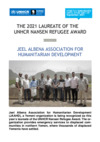Ethiopia: Somali refugees to be relocated away from border
This is a summary of what was said by UNHCR spokesperson Jennifer Pagonis – to whom quoted text may be attributed – at today's press briefing at the Palais des Nations in Geneva.
In Ethiopia today (Friday), UNHCR teams are expected to start relocating a group of 500 newly-recognized Somali refugees who fled from renewed conflict in strife-torn south and central Somalia over the last year. They have been staying around the Kebribeyah area, near the Somali border in eastern Ethiopia and are being relocated to a re-opened UNHCR camp at Teferi Ber.
The refugees are part of a group of 4,000 Somali refugees who have recently been granted refugee status by UNHCR and the government's Authority for Refugees and Returnees Affairs (ARRA). An estimated 7,000 additional Somalis who also claim to have fled fighting and insecurity in Somalia, are waiting to be screened at other sites in eastern Ethiopia.
The new camp site at Teferi Ber, some 120 km north of Kebribeyah, was formerly a UNHCR camp which in the 1990s hosted some 49,000 mainly Somalis refugees who had fled fighting in their country. The camp was officially closed in 2001 after all the refugees returned, mainly to the self -declared republic of Somaliland.
After arriving at Teferi Ber, the refugees will spend three days in a reception centre where they will be allocated plots of land to construct homes and given building materials. They will also be given food as well as tarpaulins, blankets, sleeping mats, kitchen sets, jerry cans, kerosene stoves, and soap. The ARRA has established a temporary health centre until permanent structures can be built.
The Somali Region of Ethiopia already hosts more than 16,500 refugees. With the new arrivals, the total is 20,300. At the peak of the Somali refugee crisis in the early 90s, the region hosted 628,000 refugees in eight camps. The overwhelming majority went home between 1997 and 2005, and all of the camps were closed except a camp at Kebribeyah.
Related news and stories
Thousands of newly arrived Somali refugees in Ethiopia relocated to new settlement
Samira's Story
Drought brings life-threatening food shortages for refugees in Ethiopia
100,000 new Somali refugees arrive in Ethiopia in the past month, UN and partners are calling for urgent funding
UNHCR teams and partners rush assistance to some 100,000 newly arrived Somali refugees in hard-to-reach area of Ethiopia
As the Horn of Africa drought enters a sixth failed rainy season, UNHCR calls for urgent assistance
-

Refugee Resettlement and Complementary Pathways: Opportunities for Growth
17 Sep 2021 By the end of 2020, 20.7 million refugees had been displaced from their countries of origin and sought protection under the mandate of UNHCR, the UN Refugee Agency. While some may eventually be able to return to their countries of origin or integrate locally into the society of their host country, for the most at risk, resettlement remains a critical tool for addressing their displacement by providing secure legal status and access to fundamental rights in a third country. -

Brief on the 2021 UNHCR Nansen Refugee Award
17 Sep 2021 -

COVID-19 tops list of UNHCR's most underfunded crises in 2021
17 Sep 2021 New report shows UNHCR's pandemic response has received just a third of the funds needed for this year, threatening the health and wellbeing of forcibly displaced people globally. -

UNHCR warns of dire consequences for refugees from COVID-19 underfunding
17 Sep 2021 -

COVID-19 tops list of UNHCR's most underfunded situations in 2021
17 Sep 2021 -

Biography - Chief Diambendi Madiega (2021 Nansen Refugee Award Regional co-winner in Africa)
17 Sep 2021 -

Biography - Ameen Jubran & Jeel Albena (2021 Nansen Refugee Award Laureate)
17 Sep 2021 -

Biography - Dr. Saleema Rehman (2021 Nansen Refugee Award Regional winner in Asia)
17 Sep 2021 -

Biography - Jorge Santiago Avila Corrales (2021 Nansen Refugee Award Regional winner in the Americas)
17 Sep 2021
